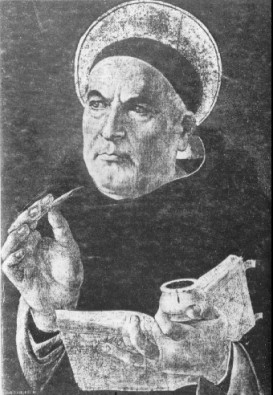 Niccolo Machiavelli and Thomas Aquinas both presented their views of man as being either animal or a mix of animal and angel respectively. Machiavelli sees man as an animal. He sees no need to treat man with respect. He believes it is perfectly acceptable to use others for your own needs and profits. On the other hand, Thomas Aquinas sees man as a cross between animal and angel. He believes that the angel part of us is what gives us compassion towards one another and draws one closer to God for it is in His likeness that we desire to do good. It can be shown that although Machiavelli understood the animal part of human nature, Thomas had a more complete understanding of our true complete nature.
Niccolo Machiavelli and Thomas Aquinas both presented their views of man as being either animal or a mix of animal and angel respectively. Machiavelli sees man as an animal. He sees no need to treat man with respect. He believes it is perfectly acceptable to use others for your own needs and profits. On the other hand, Thomas Aquinas sees man as a cross between animal and angel. He believes that the angel part of us is what gives us compassion towards one another and draws one closer to God for it is in His likeness that we desire to do good. It can be shown that although Machiavelli understood the animal part of human nature, Thomas had a more complete understanding of our true complete nature.
Machiavelli states that man is a combination of a fox and a lion. He explains that man has the cunningness of a fox and the prowess of a lion. He considers that this is man’s true nature and if used accordingly will bring success. He affirms, “Therefore, it is necessary to be a fox to discover the snares and a lion to terrify the wolves” (Machiavelli, 84). He explains that one needs to be like a fox to discover the plots against them and to be able to outsmart one’s enemies. One should be like a lion in order to have one’s enemies fear them. In Chapter XVIII of The Prince, Machiavelli goes into great detail explaining why it is better to be feared than loved. He concludes that to be feared like a lion a person can control others through their fear. He believes that love and devotion can change and therefore are uncontrollable. One can not control how much someone loves them; however, one can control how much someone fears them (78). Furthermore, he reasons that one should be as cunning as a fox and trick others into thinking that he do have love, compassion, faith, and religion. He concludes that others are more easily tricked if they think you have compassion and love for them (86). Machiavelli brilliantly shows through example after example of how acting like a fox or a lion can bring power, wealth, and control. However, the question can be asked, is this our true nature? Are these the things that bring and happiness?
 Thomas Aquinas discerns that man not only has an animal part, but also an angelic spirit which is essentially our soul, our likeness to God. It is the part that allows us to give love and compassion. Thomas asserts that man is half “corporeal organ”, animal, and half angelic intellect, a soul (Aquinas, Pt.1, Q. 85, Art. 1). He declares that we have corporeal body that is the form of our angelic soul creating a half corporeal and half angelic form. He goes on to further explain this by stating that our “phantasm”, spiritual soul/form, exists in “corporeal organs”. He deems that we do have an angelic part that supplies us with an intellect that allows us to reason and thinks about consequences which ultimately will bring us closer to God (Pt. 1 Q. 85, Art. 2). He believes that we are complete when we use not only the animal part, but also the angelic part. It is only when we use both that we can feel complete joy and bring happiness to others. Thomas speaks about the importance of doing good deeds for others. It is in this manner that we find joy in the contentment of others (Pt. I-II, Q. 4, Art. 8). Thomas concludes that loving God is enough to bring happiness to the soul, but if there was a neighbor there, love of him would result in perfect love of God thus bringing true happiness (Pt. I-II, Q. 4, Art. 8). Thomas speaks of our likeness to God. He explains that we are not identical, but are made in His image in as much as we come from Him (Pt.1, Q. 4, Art. 3). Thomas speaks of humans trying to imitate God, but because God is perfect they fall short. It is in that desire to be like God in his goodness that brings us pure joy when we achieve it.
Thomas Aquinas discerns that man not only has an animal part, but also an angelic spirit which is essentially our soul, our likeness to God. It is the part that allows us to give love and compassion. Thomas asserts that man is half “corporeal organ”, animal, and half angelic intellect, a soul (Aquinas, Pt.1, Q. 85, Art. 1). He declares that we have corporeal body that is the form of our angelic soul creating a half corporeal and half angelic form. He goes on to further explain this by stating that our “phantasm”, spiritual soul/form, exists in “corporeal organs”. He deems that we do have an angelic part that supplies us with an intellect that allows us to reason and thinks about consequences which ultimately will bring us closer to God (Pt. 1 Q. 85, Art. 2). He believes that we are complete when we use not only the animal part, but also the angelic part. It is only when we use both that we can feel complete joy and bring happiness to others. Thomas speaks about the importance of doing good deeds for others. It is in this manner that we find joy in the contentment of others (Pt. I-II, Q. 4, Art. 8). Thomas concludes that loving God is enough to bring happiness to the soul, but if there was a neighbor there, love of him would result in perfect love of God thus bringing true happiness (Pt. I-II, Q. 4, Art. 8). Thomas speaks of our likeness to God. He explains that we are not identical, but are made in His image in as much as we come from Him (Pt.1, Q. 4, Art. 3). Thomas speaks of humans trying to imitate God, but because God is perfect they fall short. It is in that desire to be like God in his goodness that brings us pure joy when we achieve it.
 Although Machiavelli skillfully demonstrates how one has the characteristics of both a fox and a lion, Thomas reminds us of our likeness to God. Machiavelli advises people how they should use one another, lie to one another, and trick one another for ones own personal gain. Even thou this may bring success in one’s status and personal gain is there true joy? Thomas answers that question quite simply by reminding us of our likeness to God, and that our desire to do good is innate; we can not separate from it. When we do good deeds we are at our happiest. Our true nature is not only our human qualities, but also an angelic qualities, our likeness to God.
Although Machiavelli skillfully demonstrates how one has the characteristics of both a fox and a lion, Thomas reminds us of our likeness to God. Machiavelli advises people how they should use one another, lie to one another, and trick one another for ones own personal gain. Even thou this may bring success in one’s status and personal gain is there true joy? Thomas answers that question quite simply by reminding us of our likeness to God, and that our desire to do good is innate; we can not separate from it. When we do good deeds we are at our happiest. Our true nature is not only our human qualities, but also an angelic qualities, our likeness to God.





Leave a comment